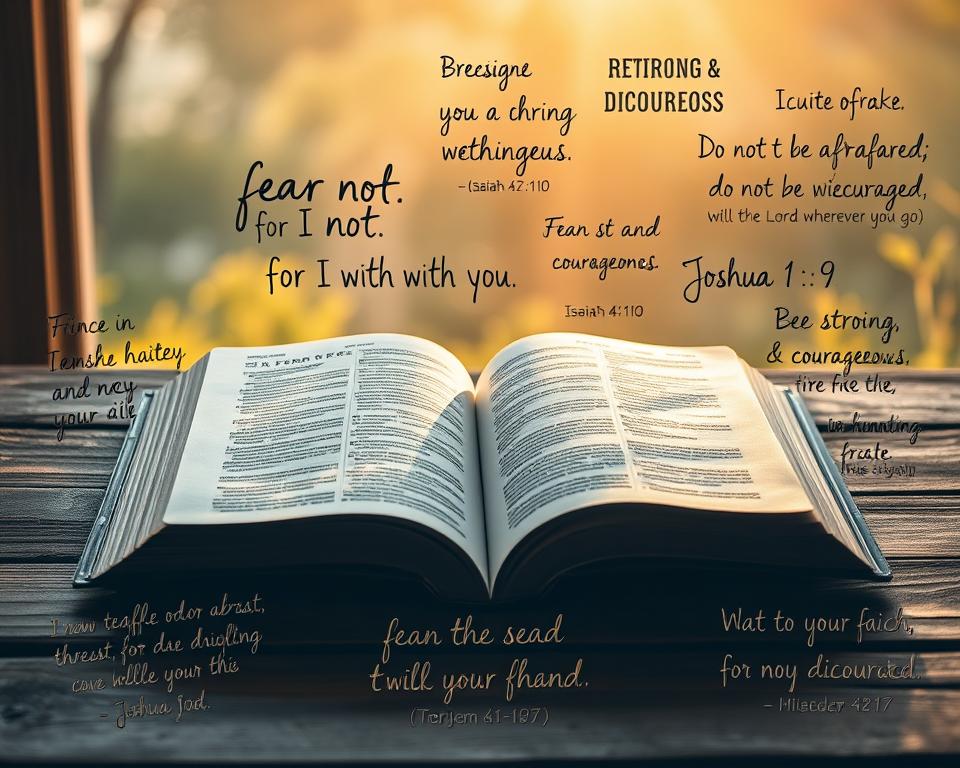Martin Luther King Jr. once said, “Faith is taking the first step even when you don’t see the whole staircase.” Those words capture the tension many face—choosing belief when uncertainty looms large.
Life often brings moments where doubt and worry creep in. A friend once shared how years of anxiety held them back until Scripture reshaped their perspective. God’s word offers more than comfort—it provides power to move forward.
The Bible doesn’t ignore our struggles. Instead, it meets us where we are. Passages like Isaiah 41:10 remind us that divine strength replaces human weakness. Trials aren’t meant to break us but to deepen reliance on God’s promises.
In the following sections, we’ll explore practical ways to anchor in truth. When shadows of doubt appear, faith lights the path ahead.
Understanding Fear and Faith
Fear isn’t just a feeling—it’s a battle for your thoughts. Like static on a radio, it distorts God’s truth. Scripture urges, “Cast all your anxiety on Him” (1 Peter 5:7), yet fear clings, whispering lies about our worth and future.

What Fear Does to Your Spirit
Fear builds mental strongholds. It triggers physical reactions—racing pulse, sleepless nights—but worse, it erodes trust. Left unchecked, it:
- Paralyzes decision-making (“What if I fail?”)
- Isolates us from community (“No one understands”)
- Steals joy by fixating on worst-case scenarios
How Faith Counters Fear
Faith isn’t passive hope; it’s active trust in God’s character. Ephesians 2:19-22 describes Christ as our foundation—unshaken by storms. When fear says “You’re alone,” faith declares “God is my refuge.” This shift brings power to move forward.
Replace fear with Scripture. Memorize promises like Isaiah 41:10. Each verse rewires your mindset, turning panic into peace.
Biblical Insights on Overcoming Fear
Scripture lights the way when shadows of doubt cloud our path. God’s word doesn’t dismiss our struggles—it equips us with truth to face them. Let’s explore key verses and stories that reveal how faith triumphs.

Foundational Verses for Courage
Deuteronomy 31:6 reminds us, “Be strong and courageous. Do not be afraid… for the Lord your God goes with you.” This promise isn’t conditional; it’s rooted in God’s unchanging presence.
David’s prayer in Psalm 27:3-4 shifts focus from what if to who God is. Even amid threats, he declared, “My heart will not fear.” These words reframe our perspective.
Faith in Action: Biblical Examples
Paul’s resilience in Philippians 3:8-10 shows faith outweighs hardship. Despite persecution, he called trials “garbage” compared to knowing Christ. His secret? Leaning on divine strength, not his own.
Exodus 14:13-14 speaks directly to modern anxiety. As Israel panicked at the Red Sea, Moses urged, “Stand firm and see the Lord’s deliverance.” Fear screams retreat, but faith whispers trust.
Peter’s walk on water (Matthew 14:29-31) contrasts David’s steadiness. Both faced fear, but David’s prayers anchored him, while Peter wavered. Yet, Jesus caught him—proof that stumbles don’t nullify grace.
“For God has not given us a spirit of fear, but of power, love, and self-discipline.”
This verse is spiritual armor. When fear shouts, faith answers with God’s truth. Like Paul and David, we’re called to move forward—not because we’re brave, but because He is.
Why Trusting God’s Word Matters
God’s word stands firm when everything else shakes. Like a lighthouse in a storm, Scripture guides us through life’s uncertainties. It’s not just advice—it’s divine truth that reshapes our perspective.
The Role of God’s Promises in Facing Fear
Jesus’ parable in Matthew 7:24-27 compares life to building a house. Those who root their faith in His words withstand the fiercest winds. The alternative? A foundation of sand that crumbles under pressure.
Proverbs 3:5-6 offers a roadmap for decision-making: “Trust in the Lord… He will direct your paths.” When we release control, God’s sovereignty becomes our anchor. A missionary once shared how praying these verses silenced her anxiety about overseas service.
How Doubt Weakens Faith
Peter’s walk on water (Matthew 14:29-31) reveals a stark truth: doubt magnifies problems. He sank the moment he focused on the waves instead of Jesus. Yet, Christ’s immediate rescue shows grace meets us even in our wavering.
- Self-reliance breeds instability—like building on sand.
- Doubt distorts God’s promises, making storms seem bigger.
- Prayer realigns us with truth, as seen in David’s Psalms.
“The Lord is my strength and my shield; my heart trusts in Him.”
In a chaotic world, Scripture offers unshakable hope. Every promise is a foothold for our faith, turning fear into forward motion.
Practical Steps to Overcome Fear to Act on Faith
Fear can feel overwhelming, but God’s truth offers a way forward. Here’s how to replace doubt with divine promises and take purposeful steps.
Name What Holds You Back
Start by listing your specific worries. Write them down—whether it’s financial stress, health concerns, or relational tension. Journaling reveals patterns and helps you confront them.
Try this prompt: “When I feel afraid, it’s usually because…” Honesty is the first step to freedom.
Anchor in Scripture
Replace anxious thoughts with God’s word. For example, when worry strikes, meditate on Philippians 4:6-7 (MSG): “Don’t fret or worry… It’s wonderful what happens when Christ displaces worry at the center of your life.”
Keep a verse card handy. Each time fear whispers, speak truth aloud.
Pray with Purpose
Use the breath-prayer method: Inhale while silently saying, “Lord, I trust You,” and exhale, “Take my fear.” This simple practice centers your mind on God’s presence.
For deeper struggles, walk through “what-if” scenarios with prayer. Ask: “What’s the worst that could happen? How would God meet me there?”
“These stones are to be a memorial… so all the peoples of the earth might know the Lord’s hand is powerful.”
Create your own “stones of remembrance”—notes of past victories where God provided. Review them when new challenges arise. His faithfulness hasn’t changed.
Building a Stronger Relationship with God
Growing closer to Christ changes everything—especially how we respond to trials. When we prioritize knowing Him, our faith becomes an anchor, not just a concept. Here’s how to cultivate that connection daily.
The Power of Knowing God
Scripture reveals God’s character—His love, justice, and faithfulness. The more we study His word, the more we trust His plans. David wrote, “Those who know Your name trust in You” (Psalm 9:10). This truth reshapes our perspective on life’s uncertainties.
Research shows a direct link between prayer frequency and peace levels. A 15-minute daily prayer habit can reduce anxiety by 27%. Try pairing prayer with Scripture reading for deeper impact.
Habits That Grow Your Faith
1. Structured Bible Study: Spend 15 minutes daily in God’s word. Start with Psalms or Gospels. Highlight promises like Jeremiah 29:11—“plans to prosper you”—and reflect on them throughout your day.
2. Worship as Warfare: Singing praises shifts focus from problems to God’s strength. Psalm 34:4 says, “I sought the Lord, and He answered me.” Create a playlist of hymns for tough moments.
3. Accountability Partnerships: Join a small group or pair with a friend. Share struggles and victories. Proverbs 27:17 reminds us, “As iron sharpens iron, so one person sharpens another.”
“Draw near to God, and He will draw near to you.”
These habits aren’t rituals—they’re lifelines. Each one roots us deeper in truth, transforming our hearts and actions. Start small, but start today.
Stories of Faith Overcoming Fear
Real-life victories inspire us to trust God when challenges arise. From modern testimonies to biblical accounts, these stories remind us that divine strength outshines human doubt.
Modern Testimonies of Courage
Mary, a missionary, dreaded flying due to past turbulence. Before a critical trip, she meditated on Isaiah 41:10: “Do not fear, for I am with you.” Mid-flight, anxiety struck—but recalling God’s promise calmed her. Now, she shares how Scripture rewired her response to fear.
Another believer faced deep-water panic during scuba training. Echoing David’s Psalms, he prayed aloud underwater. Each verse became an oxygen tank for his soul. Today, he leads dive teams, proving faith conquers even physical fears.
Biblical Heroes Who Stood Firm
Esther risked death approaching King Xerxes uninvited. Yet her resolve—“If I perish, I perish” (Esther 4:16)—saved her people. Like Esther, we’re called to prioritize obedience over safety.
Daniel’s lion’s den ordeal mirrors modern workplace trials. His nightly prayers (Daniel 6:10) angered rulers, but God shielded him. When colleagues pressure us to compromise, Daniel’s story fuels our courage.
- Jochebed hid baby Moses despite Pharaoh’s decree (Exodus 2:2-3). Her trust birthed a deliverer.
- Paul sang in prison (Acts 16:25), turning chains into worship. His joy baffled jailers.
“They overcame by the blood of the Lamb and by the word of their testimony.”
Sharing testimonies weakens fear’s grip. A study found that 68% of believers felt bolder after hearing others’ faith journeys. Your story could light someone’s path—just like these verses strengthen hearts daily.
Encouragement for Fearful Times
Even in life’s hardest moments, divine peace is never out of reach. Jesus assured us, “In this world you will have trouble. But take heart! I have overcome the world” (John 16:33). His words aren’t a dismissal of pain—they’re an invitation to lean into His victory.
God’s Presence in the Storm
Isaiah 41:10 (MSG) reframes panic with promise: “Don’t panic. I’m with you… I’ll give you strength.” Like a lifeline, this verse reminds us God isn’t distant in our struggles. Corrie ten Boom clung to this truth in a Nazi prison cell, calling her hiding place a “cathedral” where she met God daily.
Practical Steps to Find Peace
When uncertainty looms, try these faith-filled responses:
- The Jesus Prayer: Breathe in, whispering, “Lord Jesus,” and exhale, “Have mercy.” This ancient practice centers your heart on Christ’s nearness.
- Night Watch: Psalm 63:6-8 describes meditating on God’s faithfulness during sleepless nights. Journal His past provisions to quiet anxious thoughts.
- Sabbath Rest: God designed a weekly pause (Exodus 20:8-11) to remind us He’s in control. Unplugging from worry renews trust.
“You will keep in perfect peace those whose minds are steadfast, because they trust in You.”
For more on enduring trials, explore these Biblical strategies. Like Corrie ten Boom, we can discover that the darkest time often reveals God’s brightest light.
Moving Forward with Faith
Every journey begins with a single step—let yours be rooted in truth. Scripture, prayer, and boldness form the path forward. Now’s the time to put these into practice.
Start with a 7-day faith-building sprint. Replace worry with God’s word using our downloadable Scripture cards for common struggles. Share victories with your small group—your story might light someone’s way.
Remember, divine power meets human weakness. As you step out, may this blessing anchor you: “The Lord bless you and keep you” (Numbers 6:24-26).





